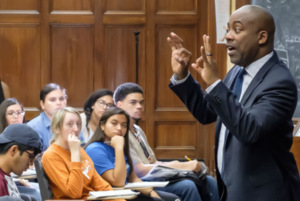“When we start getting African Americans, Latinos and other people into spaces they haven’t been before,” Dr. Leonard Moore says, “I think that creates a healthy campus climate.”
A part of The University of Texas at Austin since our founding in 1940, the Hogg Foundation joined the Division of Diversity and Community Engagement in 2007. The Division’s four pillars—campus culture, education pipeline, community engagement, and research—and a broad constituent base strengthen the university’s commitment to an inclusive campus and community.
In June, after more than a year as interim, Dr. Leonard Moore, a longtime educator and youth mentor, was named vice president for the Division. On this episode of our Into the Fold podcast, Dr. Moore lays out his vision for the Division as a change maker on campus, and in the Central Texas community.
Learning from Students to Meet their Needs
Dr. Moore has taken to his position with a long-game in mind. At the forefront of his agenda is a strong desire to prime the Division for sustainability and growth—and community engagement, in his view, will be “half the job.”
Austin has the fastest-growing population and economy of any metro area in the country—two trends that, though presenting new opportunities for some, also pose challenges for equity and inclusivity.
“There’s a lot of wealth being created in Austin,” Dr. Moore says. “One of my main priorities is to make sure that everybody gets a piece of the pie.” Initiatives like the Office of Inclusive Innovation and Entrepreneurship and Global Leadership and Social Impact, he points out, are laying critical groundwork for historically marginalized groups.
Before he was vice president, Dr. Moore was an educator. In fact, he still teaches 1,000 students every semester. His time in the classroom “keeps him in touch with student issues” while giving him the chance to build relationships with individual members of the student body.
“I really believe in this concept of reverse mentoring—what we can learn from younger people,” Dr. Moore says. “It really helps me know where I should put my time and energy, and how the Division and the university need to meet the needs of students.”
Building Platforms for Inclusion
Although it’s true that face time with students—particularly students of color and other underrepresented groups—is key, it’s also true that more than 70,000 people come through campus day in and day out. Preventing every instance of discrimination may be impossible, but creating a healthy campus climate certainly isn’t.
Giving historically excluded and underrepresented groups a voice, Dr. Moore believes, can help create a more inclusive, resilient and dynamic campus and community. That voice also functions as a critical feedback loop for Division decision-making. “I tell students, you can hold the university responsible for how we respond to it,” Dr. Moore says.
A new initiative that is poised to become such a platform is the Division’s Community Integrated Healthcare Initiative. Created in the context of the city’s Healthcare Innovation District, it will be implemented in collaboration with UT Austin’s Dell Medical School and the Hogg Foundation, and led by Dr. Octavio N. Martinez, Jr., executive director for the foundation and senior associate vice president for the Division.
In addition to devising more equitable healthcare solutions for Austin’s working-class and low-income residents, the new initiative also engages young people who, due to a lack of diversity and cultural competency in healthcare delivery, have been deterred from pursuing careers in the field.
Centering the initiative around the concept of integrated health also promises to open it up to community partners across sectors. “As Dr. Martinez would say, there are a lot of things that go into somebody’s mental health or physical health that have nothing to do with medicine,” Dr. Moore says.
Learn more about our podcast and check out other episodes!
RELATED CONTENT
- Designing for Mental Health
What if going to the clinic was an empowering experience? Design thinking can make it so. - Mental Health in the College Classroom
The University of Texas at Austin’s Well-Being in Learning Environments program is helping students succeed. - Supporting Our Dreamers
“I think it’s very important that people like you and me communicate to DACA recipients that [they] are not alone,” Sebastian Colon-Otero says. “We support you, I am here for you—let’s work together.” - Police Violence and Black Women’s Health
“We have got to look at the social context that produces certain kinds of experiences for people—and that’s directly tied to social determinants,” Dr. Christen Smith says. “Unfortunately, in the world we’re living right now, police violence is a social determinant.” - Black Student Athlete Mental Health: A Player Speaks
“If I give 100 percent, that’s good enough,” McGee-Stafford says. “It really doesn’t matter what other people expect me to do, because I’m doing this for me.” - Building a Model Healthy City
“People are part of many different communities,” Dr. Clay Johnston says. “Not just their physical community, but also the communities in which they work, and in which they share religion and other cultural commonalities.”

